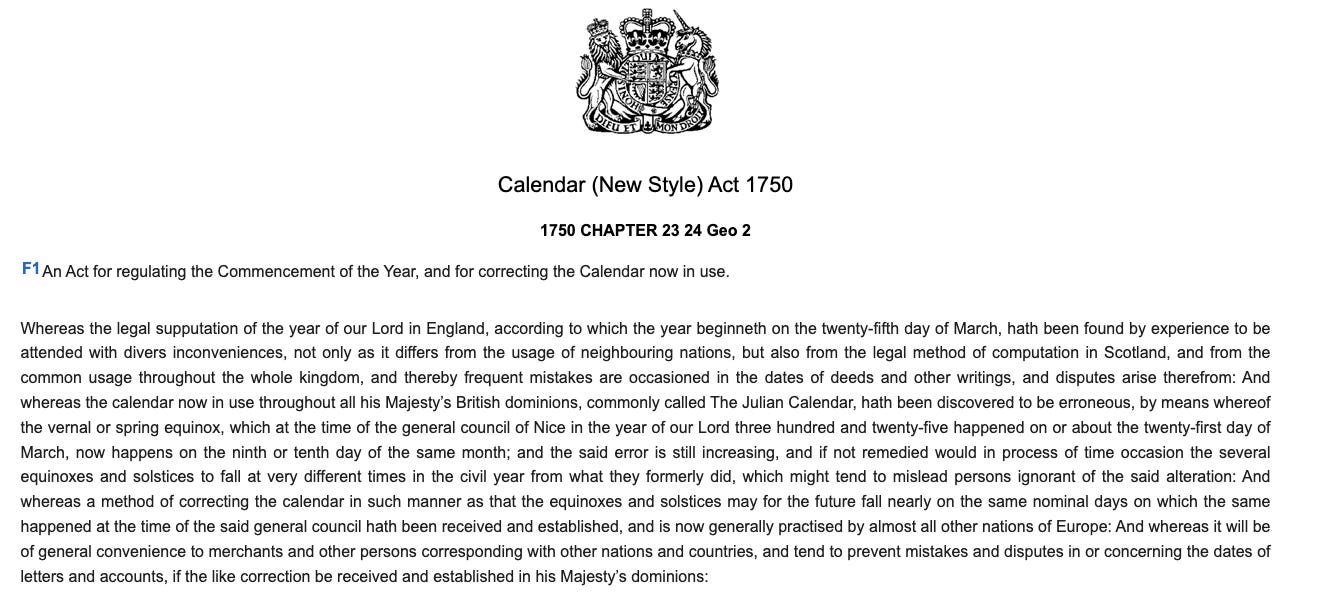How the lore of New Year defeated the law of New Year
How the English state gave up on insisting the new year started on 25 March
By the mid 1700s in England there was a curious juxtaposition between the lore of New Year’s Day and the law of New Year’s Day.
The legal system, the government, the established church, and business: all insisted that the year began on 25 March - Lady Day.
That would be the date on which, say, 1748 would become 1749.
This sort-of-made-sense for many reasons.
It would make the month beginning with ‘Sept’ the seventh month, and the month beginning with ‘Oct’ the eighth month, and so on.
It also meant that years began in spring, rather than in midwinter (bleak or otherwise).
It accorded with the conventions of business and legal transactions - and even today 25 March is one of the quarter days on which certain debts become due.
(Also at this time, Acts of Parliament and other legal instruments were usually dated by regnal years anyway.)
And it even fitted with the Christian year, for the feast of Annunciation was a good time to get spiritual things going for a new circuit of the sun, with Christmas then neatly coming nine months later.
Linguistically, legally, administratively, commercially, spiritually - everything pointed to 25 March being the start of the year.
*
But.
There was a problem.
And the problem was that people ignored what they were supposed to think, and carried on celebrating the new year on 1 January anyway, as they had done since time immemorial.
Even within the court and the corporations - as Ronald Hutton details in his great book The Stations of the Sun - they privately celebrated the new year on 1 January.
There was thereby a tension - indeed a contradiction - between the lore of new year and the law of new year.
This, in turn, had practical problems.
As A. F. Pollard explains in this informative 1940 paper, wills and other legal instruments affecting normal people often had date errors, because what people believed to be the new year contrasted with the official position.
(It also meant problems in respect of dealing with Scotland which had sensibly moved to a 1 January start date back in 1600.)
It did not matter what the church and parliament and the crown and the courts said, people persisted in acting as if the year changed on 1 January.
*
And so in 1750 the church and parliament and the crown and the courts gave up.
An Act of Parliament was passed switching the start of the year to 1 January:
The Act had this wonderful preamble:
“Whereas the legal Supputation of the Year of our Lord in that Part of Great Britain called England, according to which the Year beginneth on the 25th Day of March, hath been found by Experience to be attended with divers Inconveniencies, not only as it differs from the Usage of neighbouring Nations, but also from the legal Method of Computation in that Part of Great Britain called Scotland, and from the common Usage throughout the whole Kingdom, and thereby frequent Mistakes are occasioned in the Dates of Deeds, and other Writings, and Disputes arise therefrom […]”
This was also the Act which switched the English calendar to the Gregorian calendar, omitting the days from 2 September to 14 September 1752.
(See what you can do with Acts of Parliament. Just as powerful on matters timey wimey as any Doctor Who scriptwriter.)
Lore had prevailed over law: what people believed and practically understood to the case forced the official position to yield.
Law can only conflict with lore for so long.
*
Happy new year to all the followers of this blog, and thank you for your support.


The old date does of course persist to this day in the start of the tax year being the 5th April as that is the 25th March after being adjusted by 11 days for the calendar change!
It makes for a good quiz question: "How many days were there in the year 1751?"
Correct answer: 282